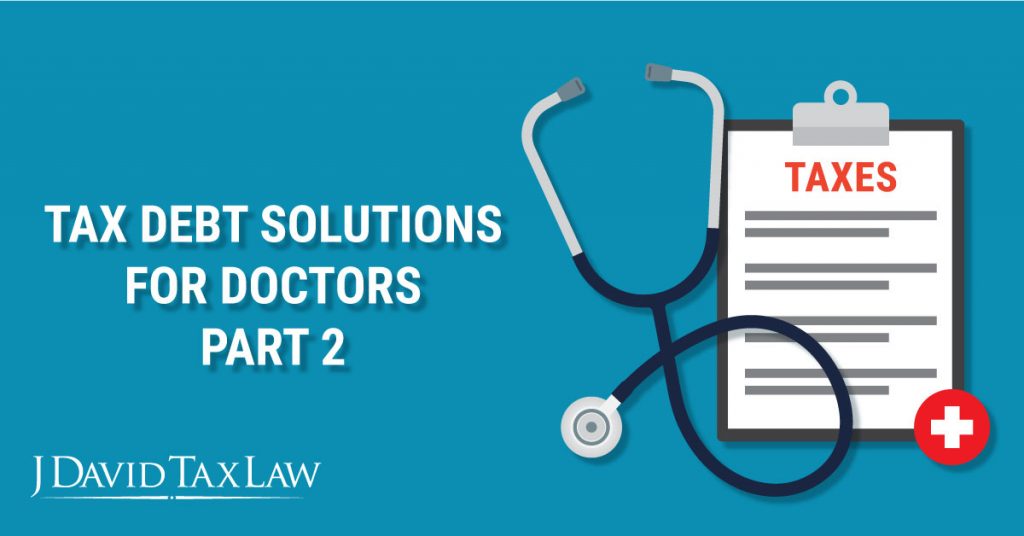According to Federal tax law, doctors are required like all professions and businesses to keep track of day-to-day expenses, report income, and pay taxes when they are due. Doctors who also have medical practices are required to file and pay quarterly 940 and 941 payroll taxes. Similar to every other business and profession, when doctors fail to pay their taxes, they can face an aggressive pursuit by state tax agencies or the IRS. When the delinquent tax debt is from payroll taxes, the doctor can lose his or her medical license due to criminal charges that can be filed for failure to pay 940 and 941 taxes. The IRS considers this a very serious offense because this type of tax is held in trust from employees’ paychecks. It should be paid to the Internal Revenue Service when it is due. Any individual or business with Payroll Tax Debt should never do the Trust Fund Recovery Interview performed by an IRS Revenue Officer. The Revenue Officer on behalf of the IRS may threaten you but they cannot force you to complete the interview without legal representation. The interview is IRS Form 4180 and if the questions are not answered correctly, it can lead to perjury and/or tax evasion Federal criminal charges. Without counsel present or legal counsel to guide you on what to answer or not answer, this potentially incriminating form interview should not be completed.
Whether it’s personal or business tax issues, if you are a doctor with tax debt, our tax lawyers are experienced at working with medical professionals in every state. Based on your unique situation, J David Tax Law can defend you against Federal and State tax agencies and we can develop creative tax debt strategies for you. Our tax attorneys have fought for 156 doctors in the last four years alone and we have a 91% success rate in gaining successful outcomes for medical professionals.
To help demonstrate our experience, the following article includes case studies from the past year along with the solutions we leverage to secure successful outcomes for every doctor.
Dr. A – Tax Debt Case Study # 3
For assistance settling his federal personal income tax debt totaling $273,000, Dr. A contacted J. David Tax Law. He had defaulted on his installment agreement that he previously negotiated with the IRS five months earlier for $1,810 per month. Dr. A was in poor health after he suffered two stokes in one year and his ability to practice medicine had seriously diminished. Due to his medical expenses, Dr. A had a lot of debt other than his tax debt and the IRS intended to get aggressive in their collection attempts. Due to a pending foreclosure and impending IRS actions, Dr. A and his family were worried they would lose their home.
J. David Tax Law’s Customized Solution for Dr. A:
To settle Dr. A’s tax debt his lawyer and staff conducted a detailed financial analysis of Dr. A’s assets, as well as Dr. A’s future earning potential. His recent medical issues had created severe pressure on Dr. A’s finances, so it was decided the best solution would be to negotiate an Offer in Compromise with the IRS. Dr. A’s lawyer was successful in securing a 90-day collection hold with the IRS while working on the case without the fear of wage garnishments or bank levies. Following two months of working with Dr. A and his wife to gather proof of Dr. A’s medical history, their financial circumstances, and their overall financial hardship, his lawyer completed and filed the Offer in Compromise. While the Offer in Compromise was under review, all IRS collection action was deferred. The Offer in Compromise was accepted after five-and-a-half months and Dr. A was able to pay a lump sum of $19,110 to settle his federal tax debt totaling $273,000. The IRS was able to see the points raised by Dr. A’s lawyer in the Offer in Compromise. They could see that it was unlikely Dr. A would be able to practice medicine again on a fulltime basis and it would be best for them to take the amount offered rather than the likelihood they’d get less as a result of Dr. A’s assets being under such pressure. This enabled Dr. A to put his focus on the other financial issues he was facing, and his family home was ultimately saved from foreclosure.
Dr. F – Tax Debt Case Study # 4
To settle his payroll tax debt totaling $379,000, Dr. F contacted J David Tax Law. On a quarterly basis, Federal law requires employers to withhold and remit 940 or 941 Federal payroll taxes to the Department of the Treasury. The enormous payroll tax debt was a result of an error made by the doctor’s 3rd party payroll company over the course of three-years-and-three-months. The IRS sent two IRS Revenue Agents from the IRS’ Criminal Investigation Division (CID) to his practice. The IRS agents delivered a summons for all financial records for the practice due to Dr. F’s tax debt. The Revenue Agents had also attempted to pressure Dr. F into completing the IRS Form 4180 Trust Fund Recovery Penalty Interview. Luckily for Dr. F, without legal representation present, he had refused to do the interview.
J. David Tax Law’s Customized Solution for Dr. F:
The first step in settling Dr. F’s tax debt included his attorneys proving to the IRS that there was no willful intent by him or the practice to defraud the IRS of collected payroll taxes. After a two-month review, the Criminal Investigation Division agreed there was no intent to defraud the IRS, but this did not relieve Dr. F of his $379,000 federal tax liability. The next major issue for Dr. F was the need for a firm of tax attorneys that would be able to ensure his practice could remain open without fear that the IRS would seize his business revenue either wholly or partially to pay off Dr. F’s large payroll tax debt. The attorneys at J. David Tax Law working with Dr. F were able to structure a payment plan allowing Dr. F to pay the payroll tax debt off over the course of years without strictly damaging his practice’s cash flow. The key element that enabled Dr. F’s attorney to get such a liberal payment arrangement hinged on proving Dr. F did not have a willful intent to withhold Payroll Tax payments. When Dr. F’s attorneys at J. David Tax Law were able to do just that, Dr. F’s concerns were eliminated and he was thrilled with the overall outcomes for his enormous tax problem.
Click here to read Tax Debt Solutions For Doctors Part 1.
We Deliver Customized Tax Debt Solutions for Doctors
Having State or Federal tax debt causes tax agencies to take action through the assessment of large penalties and criminal charges, even for doctors. When doctors do not resolve their tax debt issues quickly, the collection attempts include an aggressive pursuit. If you have been contacted by a State agency or the IRS regarding your delinquent personal income or payroll tax debt, the tax attorneys at J David Tax Law can help.
A no-cost, no-obligation consultation with our firm can be requested by clicking here.















